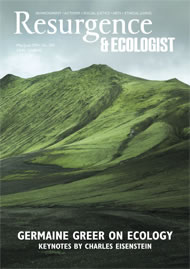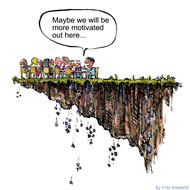The green agenda is often thought of as belonging to the left, but political philosopher Roger Scruton makes the case for right-wing politics as providing the best framework for environmentalism. Having spent his career writing on a vast range of topics from a conservative perspective, Scruton’s recent book Green Philosophy argues for conservatism as being the best position from which to consider our impact on the planet.
Left-wing politics of the 20th century have led to environmental disaster and ineffectual bureaucracy, Scruton claims. But unlike socialism, conservatism has no corresponding end goal. It concerns itself with brokering competing interests peacefully, and allowing bottom-up civil association to flourish. He focuses on the idea of Burke’s ‘little platoon’ as being the key to good environmentalism – small, local groups acting in the interest of their shared love of a shared place.
His championship of conservative stewardship is attractive, but do we see it applied in real-world politics? In the UK, David Cameron has led a right-wing government for four years, having been elected on the promise of delivering the greenest government ever. But many would question whether or not this has been achieved.
“Cameron’s track record has not been very good,” Scruton admits. “Environmental matters are subject as much to top-down decisions as they ever were, and that local sentiment is neither encouraged nor listened to by the current conservative government.”
Yet we see some parallels between Scuton’s ideals and Cameron’s realities. For instance, there seems to be at least a dotted line between Burke’s little platoon, and Cameron’s ‘Big Society’. Floating this idea with Scruton, he tells me: “the ‘Big Society’ idea was a slogan … and needed to be backed up with content. But it is always hard to do this. How can a politician encourage citizens to take initiatives without also seeming to control them?
“On the other hand,” he continues, “the little platoon is the key to successful environmentalism. Look at those few successes we have – the National Trust, the Green Belt, the RSPB, the Wildlife Trusts, and the Anglers Conservation Association are all the result of initiatives from below – and it is clear that is the best way to go.”
You can see the value in these bottom-up approaches, and many of us contribute to them every day. But you might wonder if they are enough – unaided by top-down legislation – to counter bigger-picture problems, such as the destruction caused by a globalised free market.
Scruton criticises the left for seeing conservatives as little more than big business apologists. But the accusation has a ring of truth, with neoliberalism being the dominant global agenda of the right for the last 30 years. And even he concedes that: “It is undeniable that the connection between the conservative movement and big business has been in many ways damaging, in popular perception.”
Yet while authors like Naomi Klein now call runaway climate change the ultimate example of market failure, Roger Scruton maintains that free trade is our only salvation. “Free enterprise may be part of the problem,” he admits, “but unfree enterprise is worse.”
He continues, “It should always be remembered that socialist economies are also big business, and have proved far more damaging to the environment – witness the Soviet and East European examples, and our own post-war nationalised industries, which were prevented from polluting the rivers by the anglers, using common law procedures, against the government.”
“I wrote my book,” he explains, “to persuade people that markets are part of the solution, not the problem, and that we must think the whole thing through carefully from the bottom up.”
Scruton has already suggested that Cameron’s government is failing to make good on its promise of being the greenest government ever, and isn’t offering top-down leadership on sustainability. So what fills the space left by the government? Is, for example, the popular opposition to fracking evidence of an increase in the bottom-up civil association which he advocates? Sadly, Scruton is sceptical about this.
“It would be great if the failure of top-down initiatives led to the emergence of the bottom-up variety,” he says, “but in fact they always, to some extent, depend on each other. Government must set an example, and also create the space in which people can associate for civic purposes.”
For Scruton, current realities simply don’t square with the idealised politics of his book. For all the echoes of Burkian principles in their rhetoric, the coalition has struggled to follow through on good environmental practice, and Scruton knows this.
Reflecting on this, I finish by asking him if there’s anything Cameron can do to alter this situation between now and the General Election next year. His responses, unlike his book, are more practical than ideological.
“Give up on HS2,” he begins, “show proper concern for the people worried about fracking (a government commission would help), commission a report on packaging and plastic, and what can be done to control those two nasty things ... and bring Zac Goldsmith into government. These are all cost-free initiatives, from the political point of view.”
Some greens may think that this specific advice is sensible, but many will find Scruton’s bigger points far more difficult to accept – not least his trust in the free market, and the capacity of bottom-up associations to tackle global problems. But whether or not you agree with the book’s conclusions, Green Philosophy remains a challenging argument, made from a fascinating conservative perspective.
Roger Scruton gives voice to an increasingly engaged right-wing green movement. And if that helps to prioritise sustainability across the whole political spectrum, it’s hard to imagine many greens disagreeing with that.
Green Philosophy: How to Think Seriously About the Planet by Roger Scruton is published by Atlantic Books (2012)







